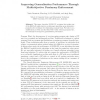Free Online Productivity Tools
i2Speak
i2Symbol
i2OCR
iTex2Img
iWeb2Print
iWeb2Shot
i2Type
iPdf2Split
iPdf2Merge
i2Bopomofo
i2Arabic
i2Style
i2Image
i2PDF
iLatex2Rtf
Sci2ools
GECCO
2004
Springer
2004
Springer
Improving Generalisation Performance Through Multiobjective Parsimony Enforcement
This paper describes POPE-GP, a system that makes use of the NSGA-II multiobjective evolutionary algorithm as an alternative, parameter-free technique for eliminating program bloat. We test it on a classification problem and find that while vastly reducing program size, the technique does improve generalisation performance. Program Bloat, the phenomenon of ever-increasing program size during a GP run, is a recognised and widespread problem. Traditional techniques to combat program bloat are program size limitations or parsimony pressure (penalty functions). These techniques suffer from a number of problems, in particular their reliance on parameters whose optimal values it is difficult to a priori determine. In this work we study the performance of POPE-GP, a new algorithm that uses the NSGA-II multiobjective algorithm as the basis for parsimony enforcement. We are especially interested in finding out if small solutions generalise better than large solutions. To achieve this, we co...
| Added | 01 Jul 2010 |
| Updated | 01 Jul 2010 |
| Type | Conference |
| Year | 2004 |
| Where | GECCO |
| Authors | Yaniv Bernstein, Xiaodong Li, Victor Ciesielski, Andy Song |
Comments (0)

